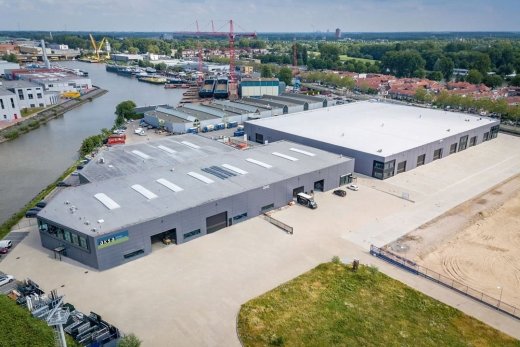In healthcare environments, where every second can determine life or death, reliable power is not a luxury-it is an absolute necessity. Hospitals depend on a constant flow of electricity to power life-support systems, operating theaters, diagnostic machines, and climate control infrastructure. When the grid fails, the consequences of even a brief outage can be catastrophic. That is why diesel generators are the backbone of emergency power systems in hospitals across the globe.
In this article, we focus on the unique needs of healthcare facilities and why diesel generators remain the trusted standard for hospital backup power solutions.
Diesel Generators for Emergency Power
One of the key reasons diesel generators are essential in hospitals is their ability to start almost instantly. When paired with an Automatic Transfer Switch (ATS), a diesel generator can kick in within seconds of a power outage. This ensures that essential systems—such as ventilators, surgical lights, ICU monitors, and emergency elevators—continue to operate without interruption.
Power Genset NL provides ATS-integrated diesel generator solutions designed for medical-grade response speeds, making sure that no time is wasted when lives are on the line.
Stable Power for Sensitive Equipment
Hospitals house an array of sophisticated medical equipment, including MRI machines, infusion pumps, and digital imaging systems. These machines require clean, uninterrupted power to function correctly. Diesel generators are known for their ability to provide steady voltage and frequency, reducing the risk of equipment malfunction or data loss.
Our diesel generator sets are engineered with advanced voltage regulation and low harmonic distortion, ensuring optimal compatibility with medical electronics.
Full-Facility Backup with Diesel Generators
A modern hospital is more than just a collection of wards – it is a 24/7 ecosystem that includes laboratories, pharmacies, kitchens, laundry services, HVAC systems, and administrative offices. The total power load can be enormous, especially during emergencies.
Diesel generators are capable of handling large, continuous loads, making them the best fit for:
- Operating rooms and critical care units
- Emergency and trauma centers
- Blood banks and storage facilities
- Diagnostic labs
Power Genset NL offers scalable diesel generator solutions that can be customized for partial or full-facility backup depending on the hospital’s infrastructure.
Long Runtime and Fuel Autonomy
Hospitals require backup systems that can sustain power for extended durations, sometimes even days especially during grid instability, storms, or natural disasters. Diesel generators are particularly effective in this role due to their ability to operate with high efficiency over long periods.
Fuel autonomy is crucial for uninterrupted healthcare services. Hospitals often maintain dedicated fuel storage tanks on-site, ensuring they are prepared for long outages without relying on external fuel delivery. Proper fuel management, such as periodic testing and turnover, is also essential to prevent degradation over time and ensure readiness when it matters most.
Moreover, diesel fuel’s energy density means less volume is required to produce the same amount of electricity compared to alternative fuels, making it a more practical option for emergency scenarios.
Compliance with Health and Environmental Standards
Environmental and safety standards in healthcare are understandably strict. Older diesel systems were once criticized for emissions, but today’s modern diesel generators are designed to comply with rigorous environmental regulations, particularly EU Stage V standards.
These generators feature technologies such as Diesel Particulate Filters (DPF) and Selective Catalytic Reduction (SCR), which significantly reduce nitrogen oxide (NOx) and particulate matter emissions. Additionally, soundproofed enclosures help minimize noise pollution, ensuring that the hospital environment remains as calm and undisturbed as possible.
Compliance with these standards is not only a regulatory requirement but also part of the broader push toward greener healthcare infrastructure.
Seamless Integration with Hospital Infrastructure
Hospitals typically use a layered approach to power protection, combining Uninterruptible Power Supply (UPS) systems with generator backup. UPS systems provide immediate power during the first few seconds of an outage, while diesel generators take over for sustained operation.
This coordinated system ensures:
- Seamless transition during outages
- No disruption in critical care areas like operating theaters and ICUs
- Reliable functioning of HVAC, lighting, and data infrastructure
Proper system integration and testing are essential to ensure a smooth handoff between the UPS and the generator during real-world scenarios.
Maintenance and Monitoring for Peace of Mind
Backup power systems in hospitals must be maintained to the highest standards. Regular testing, preventive maintenance, and real-time monitoring are all critical to ensure the system is ready to perform in an emergency.
Modern diesel generators can be equipped with remote diagnostics and alert systems, allowing facility managers to monitor performance and detect faults before they become failures. Maintenance routines often include:
- Load bank testing
- Fuel system inspection
- Battery and starter checks
- Coolant and exhaust system evaluations
Consistent servicing helps extend the generator’s life and ensures compliance with hospital safety protocols.
Cost Implications of Downtime in Healthcare
Power outages in hospitals are among the most expensive and dangerous types of interruptions. Beyond the direct costs such as lost productivity and wasted medical supplies there are serious implications for patient safety.
An interrupted surgery, loss of ICU monitoring, or failure of life-support equipment can have irreversible consequences. Downtime also poses legal and reputational risks, especially in regions where regulations mandate continuous power availability for critical care units.
While diesel generators require investment in both hardware and maintenance, this cost is marginal compared to the risks and liabilities associated with power loss.
Diesel Generators in Health Crises
Pandemics and other crisis situations place extraordinary pressure on healthcare infrastructure. During such times, hospitals may operate over capacity, run temporary wards, or extend services to off-site locations. Power demand surges, and grid reliability may become unpredictable.
Diesel generators serve as a cornerstone of crisis preparedness. They allow hospitals to:
- Sustain power for life-support and critical care units
- Maintain uninterrupted operation of diagnostic and testing facilities
- Support mobile clinics and field hospitals in underserved or emergency-affected regions
In such contexts, having a robust and flexible backup power strategy, rooted in diesel generation can significantly enhance hospital resilience.
Final Thoughts
Reliable power is not a secondary concern in hospitals, it is fundamental to preserving life and ensuring continuity of care. From intensive care units and surgical theatres to laboratories and data systems, every part of a hospital relies on uninterrupted electricity to function effectively and safely. Diesel generators, with their fast response time, high output capacity, long runtime, and compatibility with hospital infrastructure, continue to be the most trusted solution for emergency power across healthcare settings.
As hospitals face evolving challenges from climate-induced grid instability to the growing demand for sustainable operations the need for well-designed, compliant, and resilient backup power systems has never been greater.
Power Genset NL is dedicated to supporting hospitals with modern diesel generator solutions that meet both technical and environmental requirements. Whether you’re building a new facility, upgrading your existing power infrastructure, or preparing for regulatory compliance, our team can help you implement a tailored, future-proof energy strategy.
📩 Get in touch
For expert consultation or project inquiries, contact us at sales@powergenset.nl – we’re here to help healthcare institutions stay powered, protected, and prepared.

